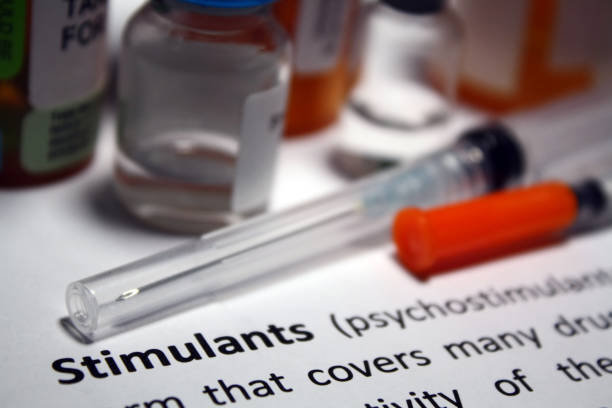10 Reasons Why Modafinil Is Not Approved for ADHD
Modafinil is a prescription drug used to treat narcolepsy, sleep apnea, and shift work disorder. Some people believe it could help with ADHD, but the FDA has never approved it for that use.
While some doctors prescribe it off-label, this is controversial due to safety concerns and limited research. Here’s why Modafinil is not an approved ADHD treatment:
1. Not Enough Long-Term Research
There isn’t enough research on how Modafinil affects people with ADHD over extended periods, especially children. Most studies, including a 9-week randomized, double-blind trial by Biederman et al. (2005), show short-term improvements in ADHD symptoms but lack long-term follow-up data.
➡ Regulatory agencies like the FDA require extensive long-term studies proving a drug’s sustained safety and effectiveness before approval. Since Modafinil’s long-term impact on ADHD patients—particularly in children—is still unverified, it does not meet this standard.
2. Risk of Misuse
Modafinil has stimulant-like effects and is widely used off-label for boosting focus and productivity. This raises concerns about potential misuse and dependence, particularly among individuals with ADHD.
🧠 A 2018 case study published in Psychiatry Investigation documented a 24-year-old ADHD patient who developed modafinil dependence, escalating his dose to 5,000 mg per day. The patient experienced withdrawal symptoms like irritability, anxiety, sleep disturbances, and cravings when attempting to stop.
➡ While modafinil is often seen as having a lower abuse potential than traditional stimulants, its impact on the dopamine system suggests a real risk of psychological dependence, especially when used without medical supervision.
3. Inconsistent ADHD Symptom Improvement
Modafinil has been studied as a potential ADHD treatment, but results are mixed. While some trials show improvements in focus, it does not work as consistently as approved ADHD medications like Adderall or Ritalin.
🔬 A meta-analysis of 3 randomized, placebo-controlled trials with 932 ADHD patients found that modafinil significantly improved symptoms compared to placebo. The effect was statistically significant in both home and school settings. However, this review only included a small number of studies, meaning the overall evidence remains limited.
➡ While modafinil shows promise, it has not demonstrated the same level of reliability as standard ADHD medications, contributing to its lack of approval.
4. Serious Side Effects
Modafinil can cause:
✔ Headaches
✔ Nausea
✔ Anxiety
❌ Severe skin reactions, including Stevens-Johnson syndrome (SJS), a life-threatening condition
🩺 A documented case of a 28-year-old man developed SJS after taking modafinil, showing severe ulceration, blistering, and mucosal sloughing. A biopsy confirmed the diagnosis, and doctors identified modafinil as the likely cause.
➡ Due to this risk, particularly in children, the FDA rejected modafinil for ADHD treatment, citing safety concerns.
5. Rejected by the FDA
In 2006, an FDA advisory panel reviewed modafinil for pediatric ADHD treatment and ultimately denied approval due to safety concerns, particularly the risk of severe skin reactions in children.
📜 According to NPR, the FDA was especially concerned about cases of Stevens-Johnson syndrome (SJS), a potentially life-threatening skin reaction, as well as the lack of long-term safety data for children. The advisory panel voted 12-1 against approval, citing unacceptable risks despite modafinil showing some effectiveness in ADHD treatment.
➡ Following this decision, Cephalon withdrew its application, effectively ending any efforts to market modafinil for ADHD in children (Schlander, 2007).
6. Can Interact with Other Medications
Modafinil can interact with various drugs, potentially reducing effectiveness or increasing side effects.
- ❌ Reduces the effectiveness of birth control pills – Modafinil induces CYP3A4, which increases the breakdown of hormonal contraceptives, potentially leading to contraceptive failure (Robertson et al., 2002).
- ❌ Affects antidepressants (SSRIs like escitalopram) – By inhibiting CYP2C19, modafinil can raise SSRI levels in the body, potentially altering their effects (Pliszka, 2022).
- ❌ Interacts with ADHD medications (Adderall, Ritalin) – When combined, modafinil may increase stimulant-related side effects, such as higher heart rate, blood pressure, and anxiety (Gerrard & Malcolm, 2007).
⚠ If someone is already taking ADHD meds, adding modafinil could make side effects worse or change how the medications work.
7. Potential for Tolerance & Dependence
While modafinil is often marketed as non-addictive, scientific evidence suggests it can lead to dependence over time.
📢 A case study published in the Journal of Pharmacology & Pharmacotherapeutics documented a 44-year-old man who developed modafinil dependence, gradually increasing his dosage to 1200 mg per day. When he attempted to stop, he experienced withdrawal symptoms, including lethargy, tremors, and anxiety (Krishnan & Chary, 2015).
➡ Experts warn that long-term modafinil use may lead to tolerance and habit formation, making it less suitable for ADHD management. Its effects on dopamine uptake may contribute to dependency in vulnerable individuals.
8. Not Well Studied in Children
Most ADHD diagnoses occur in children and adolescents, but modafinil has not been adequately studied in this population.
🧑⚕️ The FDA formally requested pediatric studies to assess modafinil’s safety in children (ages 6-17), particularly for narcolepsy and obstructive sleep apnea, but no ADHD-specific studies were conducted (FDA, 2004).
➡ Without clear long-term pediatric safety data, regulatory approval for ADHD remains unlikely. Most ADHD medications, like stimulants, have undergone extensive testing in children, whereas modafinil has not met this standard.
9. Better-Studied Alternatives Exist
There are already safer, well-tested ADHD medications that are:
✔ FDA-approved (Adderall, Ritalin, Vyvanse, Strattera)
✔ Backed by decades of research
✔ More predictable in effectiveness
🧑⚕️ According to the FDA, stimulant and non-stimulant medications have been extensively studied for safety and efficacy in children as young as age 6 (U.S. Food and Drug Administration, n.d.). In contrast, modafinil has not been approved for ADHD due to insufficient pediatric research and safety concerns.
➡ Since proven alternatives exist, there is less need for modafinil to be approved for ADHD treatment. Doctors generally prefer medications with long-term safety data, especially for children.
10. Withdrawal Symptoms
Stopping modafinil suddenly can cause:
❌ Fatigue
❌ Depression
❌ Sleep problems
🚨 A case study published in the Journal of Pharmacology & Pharmacotherapeutics documented a 44-year-old man who developed modafinil dependence and experienced withdrawal symptoms such as fatigue, depression, and sleep disturbances when stopping the drug (Krishnan & Chary, 2015).
➡ Since ADHD medications need to be consistent and reliable, modafinil’s withdrawal issues make symptom management harder.
Comparison: Modafinil vs. Approved ADHD Medications
| Feature | Modafinil | Adderall / Ritalin |
|---|---|---|
| FDA Approved for ADHD? | ❌ No | ✅ Yes |
| Proven to Improve ADHD Symptoms? | ⚠️ Inconsistent; improves attention in some cases but lacks long-term ADHD-specific studies (Gomez et al., 2007) | ✅ Consistently effective, backed by decades of ADHD research |
| Misuse Potential | ⚠️ Moderate; lower than stimulants but cases of dependence exist (Krishnan & Chary, 2015) | ⚠️ High; classified as Schedule II drugs due to addiction risk |
| Long-Term Safety Data? | ❌ Limited; lacks pediatric and long-term ADHD studies | ✅ Well-studied with long-term safety data available |
| Common Side Effects | Headache, nausea, anxiety | Appetite loss, anxiety, insomnia |
| Serious Risks | ⚠️ Rare but severe skin reactions (Stevens-Johnson Syndrome, SJS); potential for dependence | ⚠️ Increased heart rate, blood pressure; risk of cardiovascular issues in some patients |
🔹 While Modafinil has some cognitive benefits, it lacks the long-term research and regulatory approval of standard ADHD medications.ADHD medications.
References
- Biederman, J., Swanson, J. M., Wigal, S. B., Kratochvil, C. J., Boellner, S. W., Earl, C. Q., Jiang, J., & Greenhill, L. (2005). Efficacy and safety of modafinil film-coated tablets in children and adolescents with attention-deficit/hyperactivity disorder: Results of a randomized, double-blind, placebo-controlled, flexible-dose study. Pediatrics, 116(6), e777–e784. https://doi.org/10.1542/peds.2005-0617
- Alacam, H., Basay, O., Tumkaya, S., Mart, M., & Kar, G. (2018). Modafinil dependence: A case with attention-deficit/hyperactivity disorder. Psychiatry Investigation, 15(4), 424–427. https://doi.org/10.30773/pi.2016.10.25
- Gomez, Z., & Noble, P. (2015). Meta-analysis of the effect of modafinil in children and adolescents with attention deficit and hyperactive disorder. European Psychiatry, 30(S1), 1. https://doi.org/10.1016/S0924-9338(15)30458-2
- Modafinil. (2017). Reactions Weekly, 1644, 214. https://doi.org/10.1007/s40278-017-27986-8
- Hamilton, J. (2006, March 24). FDA committee rejects ADHD use for modafinil. NPR. https://www.npr.org/2006/03/24/5298885/fda-committee-rejects-adhd-use-for-modafinil
- Schlander, M. (2007). Impact of attention-deficit/hyperactivity disorder (ADHD) on prescription drug spending for children and adolescents: Increasing relevance of health economic evidence. Child and Adolescent Psychiatry and Mental Health, 1(1), 13. https://doi.org/10.1186/1753-2000-1-13
- Robertson, P. Jr., Hellriegel, E. T., Arora, S., & Nelson, M. (2002). Effect of modafinil on the pharmacokinetics of ethinyl estradiol and triazolam in healthy volunteers. Clinical Pharmacology & Therapeutics, 71(1), 46–56. https://doi.org/10.1067/mcp.2002.121217
- Pliszka, A. G. (2022). Modafinil: A review and its potential use in the treatment of long COVID fatigue and neurocognitive deficits. American Journal of Psychiatry Residents’ Journal, 17(4), 5–7. https://doi.org/10.1176/appi.ajp-rj.2022.170402
- Gerrard, P., & Malcolm, R. (2007). Mechanisms of modafinil: A review of current research. Neuropsychiatric Disease and Treatment, 3(3), 349–364. https://pmc.ncbi.nlm.nih.gov/articles/PMC2654794/
- Krishnan, R., & Chary, K. V. (2015). A rare case of modafinil dependence. Journal of Pharmacology & Pharmacotherapeutics, 6(1), 49–50. https://doi.org/10.4103/0976-500X.149149
- U.S. Food and Drug Administration. (2004). Written request for pediatric studies: Modafinil (NDA 20-717). https://www.fda.gov/files/drugs/published/N20-717S020-Modafinil-Written-Request-BPCA.pdf
- U.S. Food and Drug Administration. (n.d.). Treating and dealing with ADHD. U.S. Department of Health & Human Services. Retrieved March 3, 2025, from https://www.fda.gov/consumers/consumer-updates/treating-and-dealing-adhd
⚠ Disclaimer: This article is for informational purposes only and does not provide medical advice. Consult a healthcare professional before making any medication decisions.









can yoy take monaidil with adhd drugs?